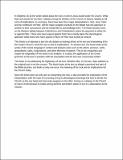| dc.description.abstract | In Matthew 16:18 the writer talked about the rock on which Jesus would build His Church. What that rock stands for has been a debate among the thinkers of the Church in history, leading to all sorts of implications. In summary, there have been four major interpretations; God, Jesus, Peter and the confession of Peter. All the major exegetes involved in the debate had one approach or another to their conclusions and we would like to acknowledge them. The thesis focuses much on the Western debate between Catholicism and Protestantism where the argument is either for or against Peter. Those who have argued against Peter have mainly taken the etymological approach while those who have argued in favor of Peter have looked at context.
This thesis is an attempt to join the old debate by looking afresh at the text and interpreting it for the modern Church; what the rock is and its implications. To achieve this, the thesis looks at the syntax of the Greek language in context and analyses areas such as the article, pronoun, verbs, prepositions, cases, conjunctions, and other elements of speech. This is the uniqueness and maybe the originality of this thesis in its analysis. It is about the application of the Greek grammar to the text in question with the assumption that the text was consciously written.
The thesis is not addressing the legitimacy of the text. Whether Mat. 16:18 was a later addition to the original text is not the concern. The thesis looks at the text as already canonized and part of the Bible doctrine, and looks at only one issue: the meaning of the rock and its implications for the Church today.
Since the thesis does not only aim at interpreting the rock, it also provides the implication of the interpretation with the hope of correcting erring ecclesiological teachings that tend to divide the Church on the one hand and inaccurate exegesis on the other. Heresy is a disease in the Church of Jesus Christ because it creates wrong doctrine and belief, which in turn is a disturbance to the mission. | en_US |

